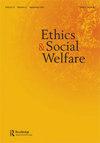The ‘Secular Culture’ of Youth Work Training: Are English Universities Equipping Youth Workers to Work with Diverse Religious Communities?
IF 0.9
Q4 SOCIAL WORK
引用次数: 1
Abstract
ABSTRACT Most professionally-qualifying youth work programmes in the UK are secular programmes in mainstream universities. Current UK National Occupational Standards require youth workers to ‘Explore the concept of values and beliefs with young people’. Faith organisations form the largest sector of the UK youth work field and all youth workers need to be equipped to work inclusively with diverse communities. This research explored, through a semi-structured survey sent to programme leaders, the coverage of religion, faith and spirituality in youth work training courses in England. We found tensions in how religion, faith and spirituality are incorporated into programmes and how programme leaders think youth workers should engage with it in their practice. Where explicit content on religion, faith and spirituality is incorporated into training programmes, it tends to focus on controversial issues such as radicalisation. The survey revealed a lack of consensus across programme leaders as to how the NOS relating to values and beliefs should be interpreted and whether their graduates are being sufficiently equipped to work with diverse religious communities. The research exposes a need for more explicit recognition of the place of religion, faith and spirituality in youth work and in the curricula of secular training programmes.青年工作培训的“世俗文化”:英国大学是否为青年工作者提供了与不同宗教团体合作的条件?
本文章由计算机程序翻译,如有差异,请以英文原文为准。
求助全文
约1分钟内获得全文
求助全文
来源期刊

Ethics and Social Welfare
SOCIAL WORK-
CiteScore
1.60
自引率
20.00%
发文量
36
期刊介绍:
Ethics and Social Welfare publishes articles of a critical and reflective nature concerned with the ethical issues surrounding social welfare practice and policy. It has a particular focus on social work (including practice with individuals, families and small groups), social care, youth and community work and related professions. The aim of the journal is to encourage dialogue and debate across social, intercultural and international boundaries on the serious ethical issues relating to professional interventions into social life. Through this we hope to contribute towards deepening understandings and further ethical practice in the field of social welfare. The journal welcomes material in a variety of formats, including high quality peer-reviewed academic papers, reflections, debates and commentaries on policy and practice, book reviews and review articles. We actively encourage a diverse range of contributions from academic and field practitioners, voluntary workers, service users, carers and people bringing the perspectives of oppressed groups. Contributions might include reports on research studies on the influence of values and ethics in social welfare practice, education and organisational structures, theoretical papers discussing the evolution of social welfare values and ethics, linked to contemporary philosophical, social and ethical thought, accounts of ethical issues, problems and dilemmas in practice, and reflections on the ethics and values of policy and organisational development. The journal aims for the highest standards in its published material. All material submitted to the journal is subject to a process of assessment and evaluation through the Editors and through peer review.
 求助内容:
求助内容: 应助结果提醒方式:
应助结果提醒方式:


